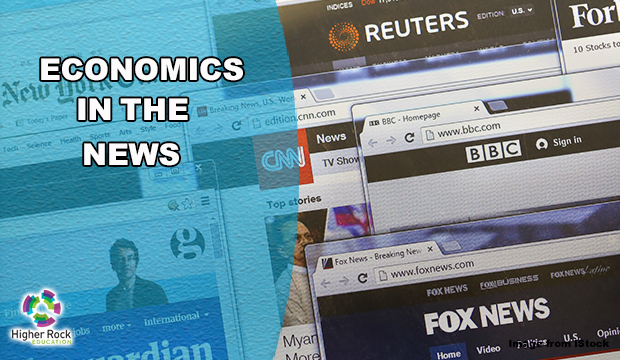
Economics in the News – Feb. 20-26, 2023
Economics impacts our lives every day. Below are some of the top storylines from this past week related to economics.
o Starbucks opened its first coffee shops in Italy in 2018, expanding in four years in the northern part of the country and recently in Florence. Now, Starbucks will offer its newest beverage in Italy: coffee and olive oil. The new drink, branded Oleato, was introduced to the masses in Milan, and was part of five olive oil-infused beverages.
Italian olive oil producers are intrigued by Starbucks’ new venture, as it could increase the visibility of olive oil among younger audiences. The Italian experiment has been an overall success for Starbucks, since breaking into the country only recently. Other American ventures have not fared so well, famously Domino’s Pizza decided to remove its stores from Italy after its brand failed to take off. [The New York Times]
o The World Bank’s preliminary assessment of the two devastating earthquakes to impact Turkey in the last month are estimated to have cost $34.2 billion in physical damages. Because of the assessment, the World Bank will revise its 2023 gross domestic product (GDP) for Turkey by 3.5-4 percent. The damage stems from residential buildings, as well as infrastructure such as railways, highways and bridges.
The World Bank will provide Turkey with $1.78 in assistance for relief and recovery. The tremors, felt earlier this month, have killed more than 44,000 people in Turkey and Syria. [Bloomberg]
o The idea of a four-day workweek continues to expand. The largest trial of the four-day workweek saw a majority of employees and supervisors decide to keep the arrangement. The study was organized through 4 Day Week Global, in collaboration with research group Autonomy, and researchers at Boston College and the University of Cambridge. Nearly 3,000 employees took part in the initiative, with 15 percent indicating that they wish to continue the four-day workweek.
Employees reported a variety of benefits, including their sleep, stress levels, personal lives, and mental health. Companies that took part reported no significant difference in revenue but saw a decrease in resignations. Most of the companies that took part in the pilot were small with 66 percent having 25 employees or fewer. Companies that took part in the trial could adopt different methods to “meaningfully” shorten their employees’ workweeks, from one day off to reducing hours to an average of 32 per week. However, companies had to keep pay the same as before. [The Washington Post]
o The United States Department of Energy has concluded that the likely cause of the COVID pandemic arose from a laboratory leak. The Energy Department joins the Federal Bureau of Investigation in saying that the virus emerged from a laboratory, while four other national agencies still believe that it was the likely result of a natural transmission. The Energy Department made its judgement with low confidence level, while the FBI made its judgement in 2021 with a moderate confidence level.
The Energy Department’s conclusion is significant because of its scientific expertise and wide network of laboratories. More than one million Americans have died since the pandemic began three years ago. [The Wall Street Journal]
o Patients are frustrated by the American health care system. A survey by Ipsos found that in 2022 just 12 percent of U.S. adults said that their health care was handled “extremely” or “very” well. In 2019, 43 percent of Americans were dissatisfied with their health coverage, nearly double the 22 percent of unsatisfied patients in the United Kingdom and 26 percent unsatisfied in Canada. Americans pay a premium for service that they say is inferior, spending more per capita than any other developed country in the world. Even still, about 10 percent of the population goes without health insurance. U.S. patients pay more out of pocket for health care than those in other developed countries, most of which offer universal health care.
Average life expectancy in the United States is lower than other wealthy nations with 60 percent of adults having a chronic disease. Part of the frustration for Americans is the difficulty in scheduling doctor appointments, where doctors fill their schedules weeks in advance. Even more, the financial strain for an individual seeking medical treatment can be substantial, causing 40 percent of U.S. adults to delay or go without medical care. [TIME]